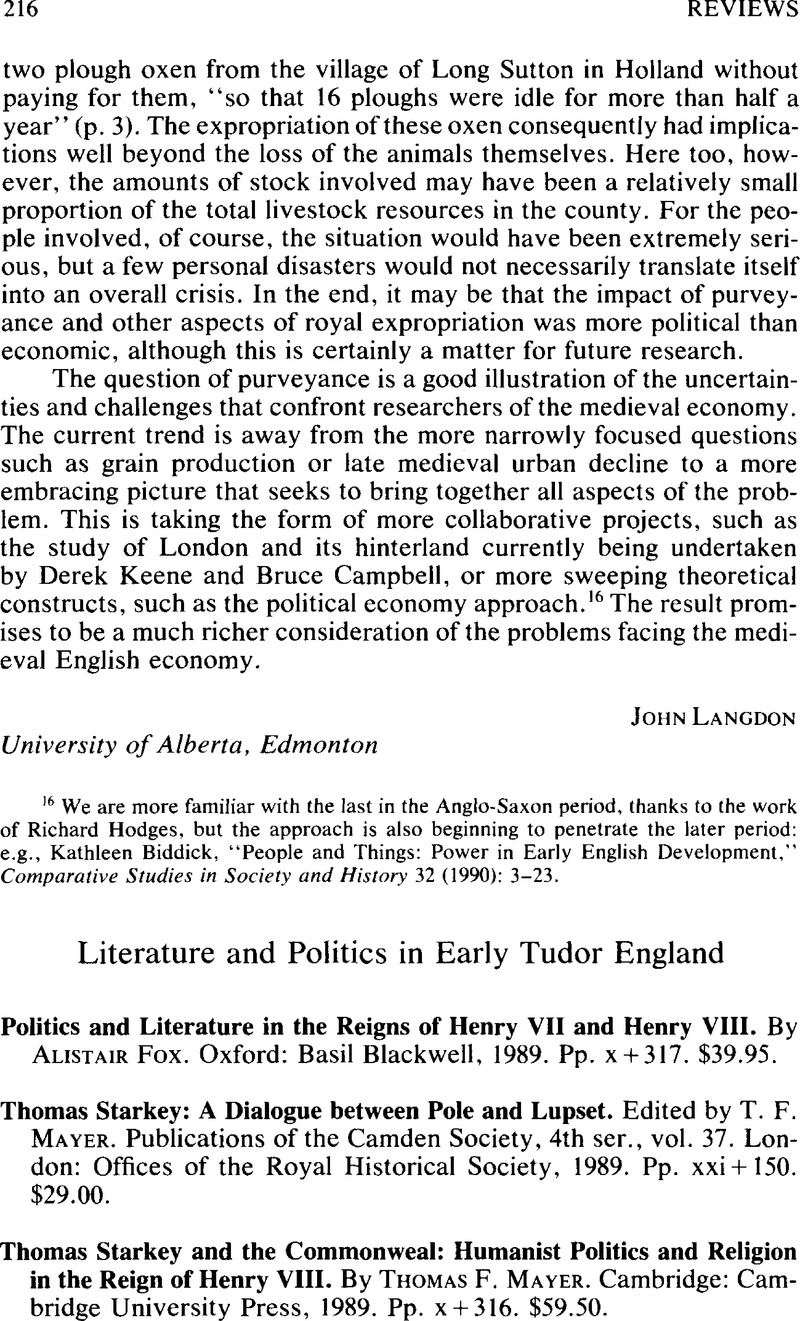Article contents
Literature and Politics in Early Tudor England - Politics and Literature in the Reigns of Henry VII and Henry VIII. By Alistair Fox. Oxford: Basil Blackwell, 1989. Pp. x + 317. $39.95. - Thomas Starkey: A Dialogue between Pole and Lupset. Edited by T. F. Mayer. Publications of the Camden Society, 4th ser., vol. 37. London: Offices of the Royal Historical Society, 1989. Pp. xxi + 150. $29.00. - Thomas Starkey and the Commonweal: Humanist Politics and Religion in the Reign of Henry VIII. By Thomas F. Mayer. Cambridge: Cambridge University Press, 1989. Pp. x + 316. $59.50.
Published online by Cambridge University Press: 10 January 2014
Abstract

- Type
- Reviews
- Information
- Copyright
- Copyright © North American Conference of British Studies 1991
References
1 The connections between Skelton and the Howards after 1495 (the alternative date for A Garlande of Laurell) were questioned by Walker, G., John Skelton and the Politics of the 1520s (Cambridge, 1988), pp. 1–34Google Scholar.
2 An idea he himself discounted in an earlier article: Fox, A., “Stephen Hawes and the Political Allegory of The Comfort of Lovers,” English Literary Renaissance 17 (1987): 13CrossRefGoogle Scholar.
3 Gairdner, J., ed., Letters and Papers illustrative of the reigns of Richard III and Henry VII, Rolls Series, 2 vols. (London, 1861–1863), 1:231–40Google Scholar; “The justes of the moneths of May and June,” in Remains of the Early Popular Poetry of England, ed. Hazlitt, W. C., 4 vols. (London, 1866), 2:114–15, 123–24Google Scholar; Stephen Hawes: The Minor Poems, ed. Gluck, F. W. and Morgan, A. B., Early English Text Society, vol. 271, (London, 1974), pp. xi–xiiGoogle Scholar. There seems to be no other evidence for Hawes's membership of the privy chamber: Starkey, D. R., “The King's Privy Chamber, 1485–1547” (Ph.D. thesis, Cambridge University, 1974), pp. 17–58Google Scholar.
4 “A new enterlude of godly queene Hester,” ed. Greg, W. W., Materialien zur Kunde des älteren englischen Dramas, vol. 5 (Louvain, 1904)Google Scholar, lines 110, 130, 376–81, 384–85, 399–416, 459–64, 601, 613, 1132.
5 Walker, G., “Cardinal Wolsey and the Satirists: The Case of Godly Queen Hester Re-opened,” in Cardinal Wolsey: Church, State and Art, ed. Gunn, S. J. and Lindley, P. G. (Cambridge, 1991)Google Scholar.
6 Miller, H., Henry VIII and the English Nobility (Oxford, 1986), pp. 165–67Google Scholar.
7 Suffolk (the earl marshal), Norfolk (appointed high steward for the trials of 1534 and 1536), and Oxford (the great chamberlain) were prominent councillors before and after Wolsey's fall: Guy, J. A., “The Privy Council: Revolution or Evolution?” in Revolution Reassessed: Revisions in the History of Tudor Government and Administration, ed. Coleman, C. and Starkey, D. R. (Oxford, 1986), p. 75Google Scholar, n. 62.
8 Starkey, D. R., “The Court: Castiglione's Ideal and Tudor Reality; Being a Discussion of Sir Thomas Wyatt's Satire Addressed to Sir Francis Bryan,” Journal of the Warburg and Courtauld Institutes 45 (1982): 232–39CrossRefGoogle Scholar.
9 Stephen Hawes: The Minor Poems, p. xxii; Scammell, G. V. and Rogers, H. L., “An elegy on Henry VII,” Review of English Studies, n.s., 8 (1957): 169Google Scholar; Williams, F. B., ed., The Gardyners Passetaunce (London: Roxburghe Club, 1985), pp. 21–23Google Scholar.
10 Thomas, A. H. and Thornley, I. D., eds., The Great Chronicle of London (London, 1938), pp. 344–47Google Scholar; Anglo, S., “William Cornish in a Play, Pageants, Prison, and Politics,” Review of English Studies, n.s., 10 (1959): 353–57Google Scholar; Horowitz, M. R., “Richard Empson, Minister of Henry VII,” Bulletin of the Institute of Historical Research 55 (1982): 48CrossRefGoogle Scholar.
11 James, M. E., “A Tudor Magnate and the Tudor State: Henry Fifth Earl of Northumberland,” in his Society, Politics and Culture: Studies in Early Modern England (Cambridge, 1986), pp. 63–64, 89–90CrossRefGoogle Scholar; Gunn, S. J., Charles Brandon, Duke of Suffolk, c. 1484–1545 (Oxford, 1988), pp. 122, 200Google Scholar; Green, R. F., Poets and Princepleasers: Literature and the English Court in the Late Middle Ages (Toronto, 1980), pp. 169–72Google Scholar.
12 For some examination of their works, see the introduction to Gunn and Lindley, eds.
- 1
- Cited by




